Bus services in Wales face cliff edge cuts, industry warns
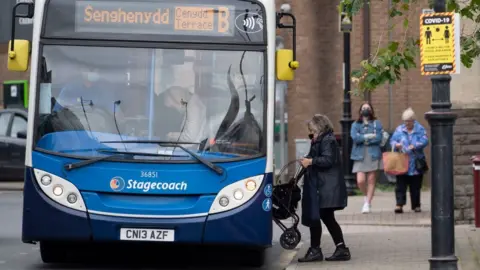 Getty Images
Getty ImagesPassengers could see reduced services or routes scrapped altogether once pandemic-era funding ends in the summer, the bus industry has said.
The Bus Emergency Scheme (BES) is set to end in June.
With fewer people now using buses than in 2019, one industry boss warned of a "cliff edge" with some smaller firms having to leave the market altogether.
A government minister said he was working with the industry to see which services are important.
Bus firms in Wales, Scotland and England were provided with subsidies to keep routes on the road after passenger numbers collapsed at the start of the pandemic.
But despite Covid restrictions having long since eased, bus companies say passenger numbers have not recovered - with older customers in particular not fully returning to services.
The Welsh government recently extended the scheme into the new financial year, but only for three months.
Welsh Deputy Climate Change Minister Lee Waters recently told the Senedd that the extension would give the industry a reprieve to work out which routes to keep.
But he argued the Welsh government could not afford to continue the scheme, and said that he hoped there could be a "skeleton service" after the scheme ends.
Bus firms also get grants from councils and receive money when holders of concessionary bus passes use their routes.
The most recent official figures show that passenger journeys were down 43% in Wales in 2021-22 compared to 2019-20.
Mel Evans is managing director of Mid Wales Travel in Aberystwyth, which runs six bus routes on a commercial basis and three others subsidised by Ceredigion council.
Mr Evans said the commercial services are "in danger" - and some of them could be scrapped.
"We've already had to cut some of them back to every two hours instead of every hour, just so that we know that we can save them and keep them going," he said.
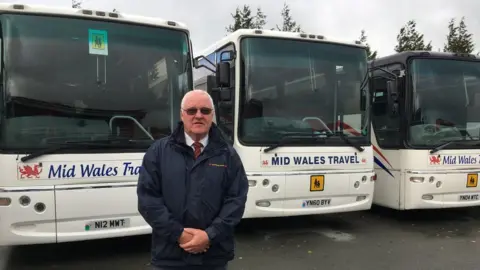
Mr Evans said the BES has been a "lifeline". He said the company's passenger numbers remain 50% down on what they were before the pandemic. Older people, he said, have not returned to buses.
"Mrs Jones would, for example, go into town on a Monday and get a bit of shopping. On Wednesday she would go and have her hair done, Friday again do a bit of shopping.
"Through Covid she found out she could have her food and shopping delivered on a Monday and Friday. The hairdresser now comes to her house and when she meets her friends they meet in somebody's house. That's four journeys lost."
Richard Thomas is head of operations with Edwards Coaches, which operates three public service routes in the Rhondda Cynon Taf area.
One of the three - the 90 from Gwaunmiskin to Pontypridd - would likely be scrapped in its current form once the BES ends.
"We're working closely to try to keep some of those services going beyond June, if we can merge them with the 100 service, which is similar that operates via the main road.
"But on its own the 90 service just doesn't stand up," he said.
Other services the company runs could see a reduced frequency, he explained. He is hoping that a scheme by Rhondda Cynon Taf council for free travel in March may encourage people back, making cuts unnecessary.
But he said if passenger numbers remain the same as they are now "then we would definitely need some form of support to carry on running".

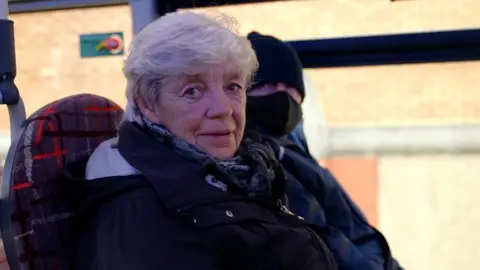
Passengers on the number 90 say it's a "vital" service for them to get into Pontypridd.
Many use their bus passes and say it's their main way of getting about. Susan Rice-Bevan, 62, from Llantwit Fardre, hops on two or three times a week.
"It is quite a trek up to the main road to use another service which a lot of elderly people in the community find quite difficult," she said.
If it were lost "it would isolate a lot of people who can't get out to do their shopping, who perhaps haven't got the facilities to do online shopping".
John Wornham, 92, from Church Village said: "It's essential to me to get to the village because the only way I can get up the hill is on the bus.
"Once a week I go to Ponty on a Wednesday to do my shopping in the market."
Marge Jones, 70, from Tonteg was taking her husband Derryck, 72, to a medical appointment.
"It's a lifesaver," she said. "We rely on this."

The chief executive of a bus industry body that represents 50 members said 15-20% of the bus network might be lost once the funding ends.
Graham Vidler, of the Confederation of Passenger Transport, said while larger firms might be able to downsize and adjust, there would be more severe consequences in rural areas and "in areas which are particularly dependent on people travelling on their free bus passes".
Small and medium firms could face leaving the market altogether, he said.
Mr Vidler estimated that while fare paying passenger figures are down 10% on the start of the pandemic, bus pass passenger figures are down 35%.
"We will see some communities, particularly in rural West Wales, cut off from the bus network altogether", he warned.
He said larger firms would also need to reduce services which could mean reduced frequencies, fewer services at weekends, later starting times and earlier finishing times.
"If you suddenly take that scheme away you get that cliff edge effect where all of a sudden a large proportion of the network suddenly becomes unviable".
He argued that more of the £60m cash earmarked for concessionary fare subsidy in the budget should reach bus firms.
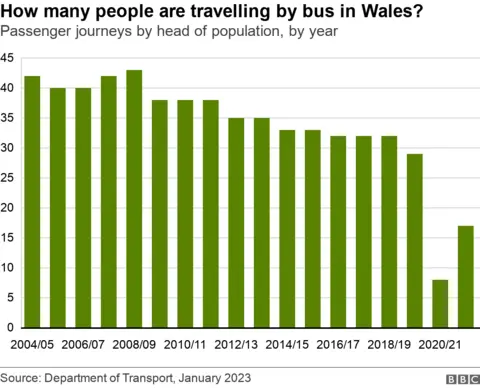
Lee Waters, speaking at the Senedd climate change committee on Wednesday morning, said the government was hoping that "in exchange for a certain amount of money... we are able to reach agreement on which services are more important than others".
He said the Welsh government faces a "very difficult dilemma that the privatised bus industry has only been able to survive through public subsidy during Covid".
"Passenger numbers have not recovered, the farebox has not recovered."
"The reality is, we're going to have to face changes," he said.
"Energy spent on trying to say we should keep things as they are is not well spent energy, because we can't keep things as they are."
But he said he did not know what a core service meant, saying it was hard for bus firms to forecast.
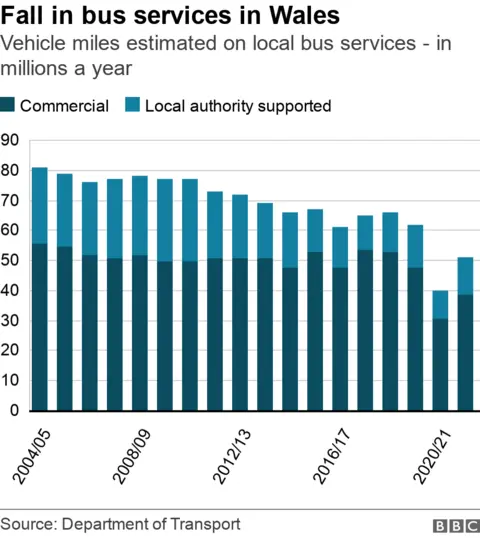
Coach and Bus Operators Cymru (CaBAC), which represents smaller firms, also warned that a reduction in fleet sizes could lead to fewer drivers and vehicles available for home to school transport.
"The knock-on effect would be widely felt - not only would local bus services be decimated with people unable to travel for employment, shopping, hospital and other important appointments," it said.
The Welsh government said it has provided "£48m in emergency funding to the bus industry this financial year and approximately £150m since the beginning of the pandemic".
"When we confirmed an initial three month extension of funding earlier this month, we made clear that we need to start to transition away from this emergency style of funding," a spokesman said.
He said plans for franchising, where private firms would have to bid to run services, "is a key step towards introducing legal powers to deliver a new model for running buses in Wales".
"This is a chance for us to deliver better connected services and we will continue to work closely with local authorities, operators and other partners - including Transport for Wales - to build a strong and sustainable bus network for Wales," the spokesman added.
